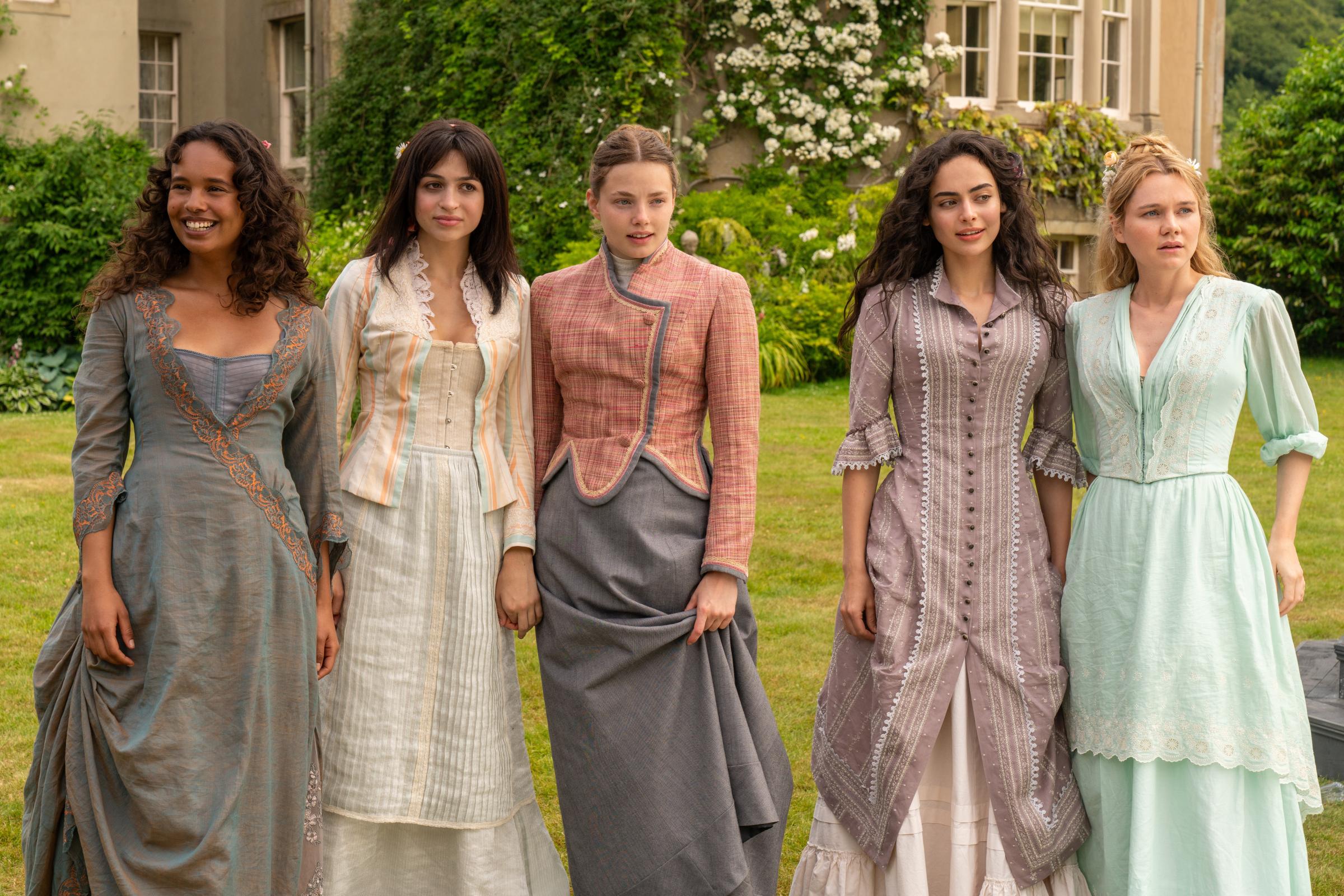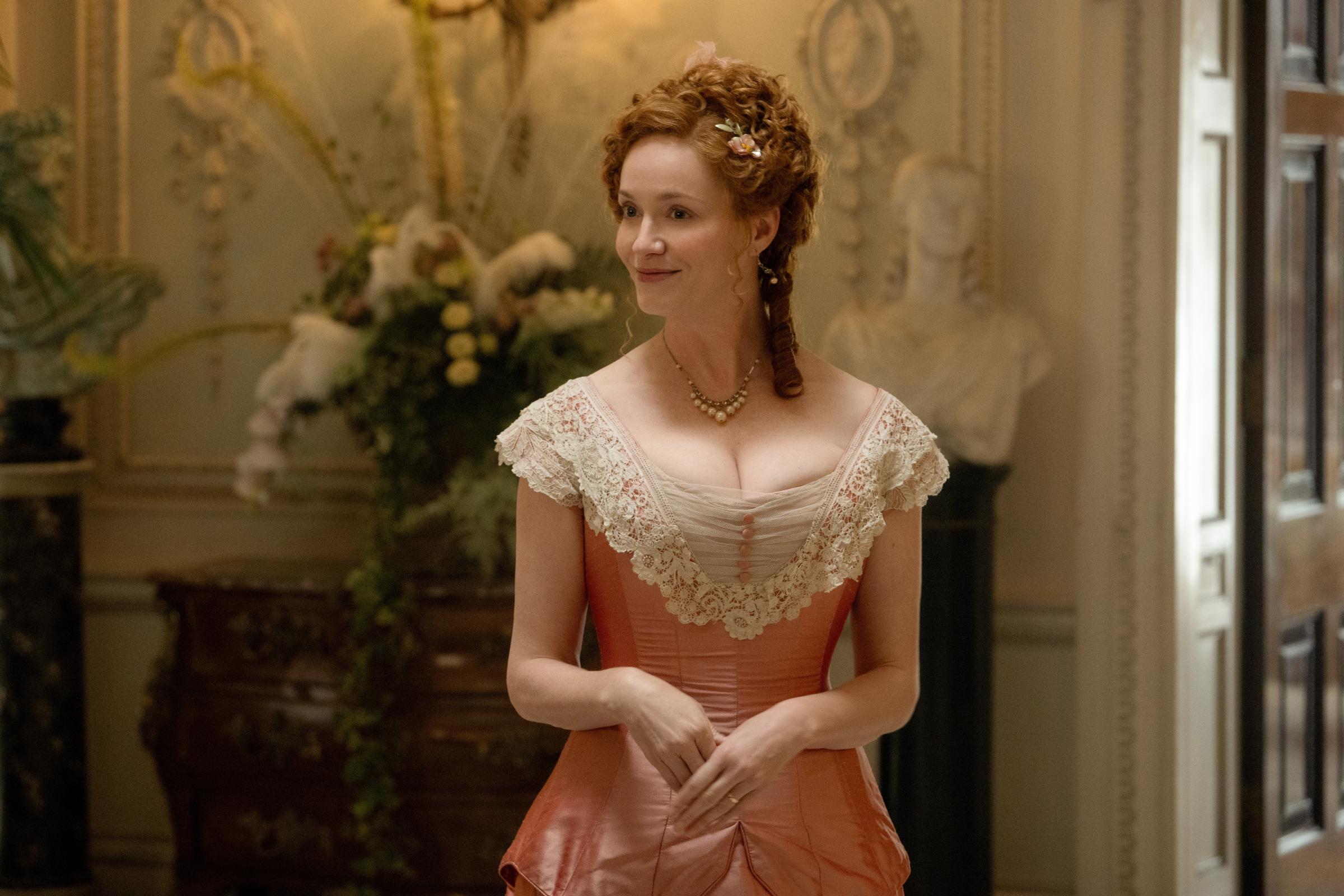From The Gilded Age to Gossip Girl, Edith Wharton’s novels of late-19th-century Manhattan high society have loomed large over the TV dramas of the 21st century. So it’s surprising that we don’t see more Wharton adaptations on the small screen. Finally, Apple TV+ has taken on her unfinished final novel, The Buccaneers, and the result, debuting Nov. 8, owes at least as much to swoony period romances like Bridgerton as it does to the author’s surgical dissections of social mores.
The skeleton of Wharton’s plot is kept intact: five wealthy American girls of approximately debutante age decamp to London to shake off their new-money stigma by marrying British nobility. Prestigious but, in many cases, poor, the English boys are drawn to the new arrivals’ free-spirited vivacity—and, perhaps to an even greater extent, their money. On both sides, and among the more passive, eligible local girls who feel blindsided by their free-spirited American counterparts, love, competition, and sabotage ensue. Also parties. A whole lot of parties.

While each young woman gets her moment in the spotlight, our heroine is the vivacious Annabel “Nan” St. George (Kristine Frøseth from The Society, irresistible), a recent transplant to New York from the backwater of Saratoga. More focused on her friends than her love life, Nan is the glue that holds her clique together. But that can be hard to do when her best friend Conchita (Alisha Boe) arrives at the altar already pregnant and Nan’s gorgeous older sister Jinny (Imogen Waterhouse) is throwing elbows to lock down the bachelor of her choice. Early in the series, Nan also learns a heartbreaking secret that makes her question her place in this community.
It just figures that the least marriage-oriented girl of the bunch would be the one who winds up in the messiest love triangle. First she begins a flirtation with the charming Guy Thwarte (Matthew Broome). Then she meets an undercover duke, Theo (Guy Remmers), who passes himself off as a humble painter because he’s sick of women who are only after his title. Everyone in this triangle is hiding a bombshell about their identity or motives, and the staggered detonations bring some novel twists to a moldy trope.
Worried, perhaps, that a more straightforward adaptation would bore young viewers, creator Katherine Jakeways punches up the drama with some Rhimesian touches. The feminist consciousness is contemporary, as is the soundtrack; a female-fronted cover of LCD Soundsystem’s “North American Scum” plays over the Instagram-ready, neon-floral opening credits. There’s a queer romance. The cast is racially diverse. Gen Z favorite Josie Totah, who played an out-and-proud trans reality TV star in 2020’s Saved by the Bell reboot, is the funniest of the buccaneers, expertly dispensing anachronous but entertaining one-liners.

Although it can be jarring to hear Whartonian bon mots juxtaposed with contemporary idioms and inflections, there’s nothing inherently wrong with any of the above. Every generation is entitled to keep classic literature alive by making it its own, and it's great that so many young viewers will see themselves reflected in the cast of characters. But this Buccaneers has a problem similar to the one that plagued Bridgerton until a prequel, Queen Charlotte, cleared up the confusion: some forms of racism do exist in this alternate 1870s, but it’s not always apparent how representative they are of the larger society’s views on race.
More frustrating is the show’s emphasis on the familiar melodramatics of romance—couples’ urgent embraces, the scorn of jilted lovers, a man literally howling on top of a cliff out of desire for someone he can’t have—over the more subtly fraught relationships among girls who are rivals as well as sisters and friends. The tenderness between Nan and Conchita; the tension between Totah’s Mabel, who wants to stay in England, and her sister Lizzy (Aubri Ibrag), who flees to New York after a traumatic experience; the cold war between Jinny and Lizzy, who are after the same man—these are some of the most fascinating interpersonal dynamics the series has to offer. Even more captivating are Nan and Jinny’s very different relationships with their mother, played by Christina Hendricks. Just as she did in Mad Men, Hendricks evokes deep empathy for a woman both vulnerable and resilient, whose thick skin hides a lifetime of humiliation at the hands of the people she loves most. I wish she’d gotten more screen time.
All told, The Buccaneers is neither a resounding success nor an utter failure. It’s a perfectly adequate teen drama with corsets and carriages, which might well be enough to satisfy its target audience and should keep anyone else with a passing interest in the subject matter and nothing better to watch reasonably entertained. I’m not terribly disappointed, but I do hope we’ll see some more ambitious Wharton adaptations soon.
More Must-Reads from TIME
- Donald Trump Is TIME's 2024 Person of the Year
- Why We Chose Trump as Person of the Year
- Is Intermittent Fasting Good or Bad for You?
- The 100 Must-Read Books of 2024
- The 20 Best Christmas TV Episodes
- Column: If Optimism Feels Ridiculous Now, Try Hope
- The Future of Climate Action Is Trade Policy
- Merle Bombardieri Is Helping People Make the Baby Decision
Contact us at letters@time.com